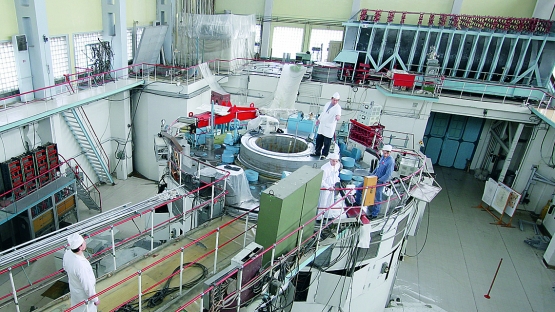The IAEA is playing an important role in supporting the sustainable and safe operation of research reactors, and should continue to assist countries embarking on new research reactor projects and facilitating access to facilities for countries that do not have research reactors themselves, a group of experts concluded at a recent Technical Working Group on Research Reactors meeting in Vienna.
Aging management and effective utilization are major challenges for operators of research reactors – nuclear reactors are used not to generate power, but to produce neutrons to support research, education and training. Research reactors are also used in the production of radioisotopes for medicine and industry.
The Technical Working Group, made up of 20 technical experts, regulators and senior managers from countries with operating research reactors, meets every year to provide advice and recommendations to the IAEA on how to help countries optimize the operation of the 250 research reactors operational in 55 countries around the world.
“Maintaining a high level of safety is essential to ensure effective utilization of research reactors to maximize their benefits to the society”, said Amgad Shokr, Head of the IAEA Research Reactor Safety Section. “Member States continue to improve the safety of their research reactors but challenges remain, particularly in relation to regulatory effectiveness and ageing of facilities. Rigorous application of the IAEA safety standards will help address these issues.”
Many research reactors have been operating for decades, thus managing their aging is an issue of paramount importance. “Around half of the operating research reactors are over 40 years old, therefore modernization of these facilities is an issue of central concern to ensure they can continue to perform in a safe and efficient manner,” said Sean O’Kelly, Associate Lab Director of Advanced Test Reactor Complex at the Idaho National Laboratory, and the Chairman of the Technical Working Group on Research Reactors.
Providing access to all
Many developing countries are increasingly interested in gaining access to research reactors for scientific and research purposes.
“The IAEA is committed to support those countries that don’t have research reactors to gain access to them or to build a domestic one,” said Andrea Borio di Tigliole, Head of the Research Reactor Section at the IAEA.
Some are considering the construction of a domestic research reactor while others are considering accessing research reactors abroad. “There are existing research reactors that can accommodate more users and these facilities can be made available to countries that don’t have one,” O’Kelly said.
The Agency has launched several initiatives to support capacity building of future experts from Member States without a research reactor. These include the International Centre based on Research Reactor (ICERR) scheme, with currently designated centres in France and in the Russian Federation, the Internet Reactor Laboratory (IRL) programme, and several hands-on training schools conducted at research reactors.
The members of working group come from the following countries: Argentina, Australia, Austria, Belgium, Brazil, China, France, India, Indonesia, Israel, Italy, Morocco, the Russian Federation and the United States.






